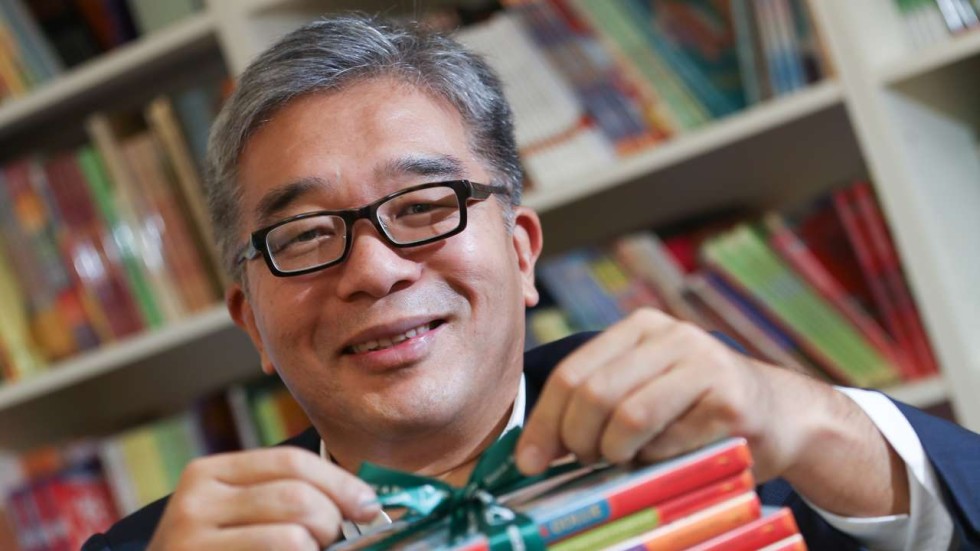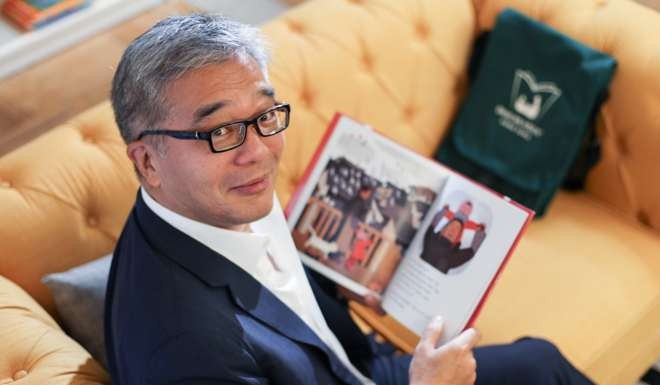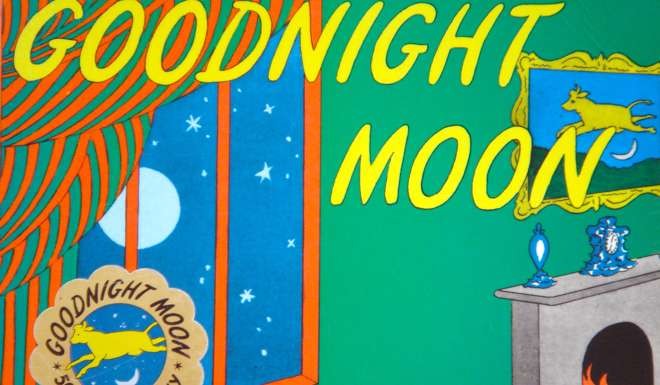James Chen Yue Jia wants to get youngsters reading for fun through his Bring Me a Book foundation, but he laments a lack of quality material and says the city’s busy parents must set a good example
- South China Morning Post – Saturday, 17 December, 2016
- By :Jessie Lau

When philanthropist and entrepreneur James Chen Yue Jia visited a school library in his hometown of Qidong in Jiangsu province, he was surprised to find empty shelves and very few children’s books.
“This was something strange to me,” said Chen, whose family made grants to stock the library with books chosen by teachers, students and parents.
The library project eventually inspired the founding of the Chen Yet-sen Family Foundation with a focus on early childhood literacy and library development, which in turn led to the establishment of a non-profit organisation called Bring Me a Book, which is the Hong Kong arm of the international organisation that goes by the same name.
Co-founded by Chen a decade ago, it serves children who lack access to quality books. Since its launch, the foundation has set up over 350 libraries, helped 130,000 children and trained 22,000 teachers and parents in childhood literacy.
According to a 2011 study by Boston College in the United States, Hong Kong had the lowest rate of family literacy – which refers to parents and children learning together – in the world, with only 12 per cent of parents participating in preschool literacy activities. The international average was 37 per cent.
Earlier this year, the government also revealed that the number of visits to the city’s district libraries declined 3 per cent between 2012 and 2014. Last month, popular bookstore chain Page One closed as a result of high rental costs and fierce competition from online sales.

Chen, also founder of the Clearly Campaign that aims to provide access to vision correction services, sat down with the Post to discuss the importance of childhood literacy and how the city can tackle this pressing issue.
How did you become interested in launching the Bring Me A Book Hong Kong organisation?
Bring Me a Book started as an outgrowth of what Family Foundation was and is interested in, which started as school libraries in China. This was around 2004. Actually, when you look in the schools’ libraries they have a metric of 10 books per child. The quantity was there but the titles were all teacher training manuals and periodicals – things that were not of interest to the kids. And it was something that we felt we had to do something about. That’s how we got started.
I’m not a big fan of reinventing the wheel, so the next summer we did an internet search of different programmes that might be applicable, and that’s when we stumbled onto Bring Me a Book. We were initially thinking of it for the mainland, and then as we understood what it was really trying to do we realised it was too sophisticated for the mainland environment at the time. We said, “Wait a minute, [this could work in] Hong Kong.”
How has Hong Kong’s reading culture changed since you first started?
It’s really fascinating – there has been a change. When we started it was just such a foreign idea for parents to read to their children. Something like only 12 per cent of parents say they read to their children, and the global average is 37 per cent. The whole mindset is that it’s such a strange idea. Parents say, of course I want my kids to read and read well, but they’re thinking about reading for school or textbooks. Most kids, if you go to them in the fourth grade or above … normally it’s the last thing they want to do because they associate it with school work and not enjoyment.
What we’re trying to do is develop that habit and enjoyment of reading from a very young age. We believe that this kind of reading really instils this concept of lifelong learning that is important for everybody. It’s also been proven that children who are read to and read from an early age can do well academically even up to the high-school level. Ironically, that’s the only thing that the parents can proactively do for their kids to have an influence on their future academic performance. All this stuff about sending them to this and that class, actually you end up spending a lot of money but the impact is not as great as spending some time to read to them. There’s also a qualitative element which is bonding and communication between the parent and the child, which we think is also very important. What you want to be doing is really nurturing the “three Cs” – compassion, critical thinking and either communication or creativity. These are the kind of things we all as parents want our child to have. The American Association of Paediatrics in 2015 recommended three things for newborns: breastfeeding, vaccinations and to be read to.
How can we improve Hong Kong’s rate of child literacy?
Unfortunately, I think this is a general comment not just on the Hong Kong government, but governments [in general] tend to lag behind in terms of keeping up to date on the latest ways to engage, to display and to attract customers. Generally governments are not known as customer friendly, so that is a challenge.
The government’s education department understands this issue about the early childhood literacy rate. Yet before we came along, and I think they may still do this, the government said they want more children to read, and all these NGOs came up with proposals, [one of which was] let’s get as many children as possible to read the same book at the same time so that we’re in Guinness World Records. That was happening here. If you think about it, from a government or a bureaucrat’s understanding, that would be a good response. But if you compare that to what we do here, we recognise that if you want children to read you actually need to engage the parents and teachers.
What we do here is very much about engaging with parents and teachers to tell them why it’s important to read … and how to go about reading to children in the right way. [We have a] fun course called First Teacher’s Training. Now 22,000 teachers and parents in Hong Kong have completed it. I think the government could do more, and we think they should do more, and we’re trying to engage but it’s a very long-term process. There’s a lot of different priorities.
Can you talk about the closure of Page One and how that fits into this issue of Hong Kong’s poor reading culture?
It’s a very challenging environment. In the time that we have been around, we’ve had this further challenge which is electronic. Which is why for us we feel it’s even more important to stress the value of books and reading. We always promote the idea, particularly at a young age, of picture books – physical picture books – because there’s that sharing, page-turning and colourful illustrations. It’s the engagement of parents and the child that we think is very important, not just the book itself. I think once you get started on that you have a better chance of giving the child some understanding of balance.
Everybody enjoys playing video games and using WeChat and all that kind of stuff, but I think children who don’t have the reading background are even less likely to engage in lifelong learning. Whereas those who are exposed to it, they might get distracted by [electronics] for a while but hopefully they can come back to it.
Commercially, while I think the bookstores are in decline, I don’t know if there are statistics to look at the impact of online book sellers or to show a general decline in reading. In Hong Kong, with its high property prices, I think that affects the cost of the delivery of books. I have to say that while Page One and some of the stores we know have closed, others have come in, such as Eslite from Taiwan. It’s booming. While they sell other things, books are a big part of it, and they are also very supportive of Bring Me a Book.
Public libraries are also becoming less popular. How can we boost this sector?
I think, certainly, having a good dynamic public library system [is important]. It’s got to keep up and be relevant and not be static. I think accessibility is an issue, particularly for low-income parents. Within our First Teacher’s Training module, the third module is actually taking parents to the local library and getting them a library card and talking to the librarian responsible for children’s books, to really help them break down the barriers. For someone who has never been, the unknown makes them feel threatened. But once you break the ice and go in, they’ll say: “Wow, this is available.”
Tell me about the Feng Zikai Chinese Children’s Picture Book Award – the first globally recognised national award for original Chinese-language children’s picture books. What made you decide to create this?
As we started to install these book cases, the feedback was, “wow, these are great, but these are English books – we want Chinese books”. We found it difficult to find good quality Chinese children’s picture books. One of the academics helping us at the time told us something that gave us a “light-bulb moment”. He said that, unlike in English and many other major languages, there’s no tradition of producing picture books for children in the Chinese language. This was stunning to my wife and I when I first heard it. But it instantly resonated because when we went to places like Taipei or Singapore, my wife would immediately make a beeline for the local libraries and she would find these children’s picture books in Chinese which she said were so much better than in Hong Kong but still not as good as English books.
We didn’t think we should be in the book publishing business. We thought maybe we should have created the equivalent of the Newbery-Caldecott Award to recognise the best illustrators and writers of children’s picture books. The winning books tend to sell eight to 10 times the print run of a typical book, which in the US is about 5,000 copies. So there’s an economic incentive. If you take a typical children’s book publisher today, say in Hong Kong, [mainland] China or Taiwan, is it more risky to publish a book like this or to buy a Caldecott-winning book, translate it and just sell that? Because it’s an award winner, it’s less risky to do that than to commission something else which is more challenging to do. But if there is a prize and sales go up because of it, [that might change their mindset]. The first book that won the prize was picked up in Britain and the US, and in that year it was on The New York Times list of top 10 children’s picture books in the book review section. That’s exactly the effect we were hoping to have.
What are your views on philanthropy in Hong Kong?
Some would say that because I was educated abroad, I have a very Westernised view of philanthropy. While money is one factor, what is more important is the time and effort we put in to understanding people’s needs and what we can do about them. So far, not as many people in Chinese culture do that. There’s this sense of being very charitable – you see all our big families here giving money – but the impact and effectiveness is not as good as it perhaps should be because they don’t understand the depth of the issues, what the real challenges are for the communities today, and they don’t address them as fully as they could or should. To be really successful you have to pick up on issues that resonate with you personally. When we started with early childhood literacy … I think that was always in the back of my mind because I had very young children then. To be truly effective in terms of giving is to really develop domain expertise and depth of understanding of a particular issue. We certainly don’t lack people with wealth here, but it’s a matter of being able to get engaged and really make a difference.

QUIRKY QUESTIONS
What are your favourite children’s books?
Goodnight Moon and The Very Hungry Caterpillar.
Who was your childhood hero?
James Bond is the first one that I remember.
If you could have one wish guaranteed to come true, what would it be?
To give universal access to vision correction for the 2.5 billion people in the world with poor vision and no means of improving it.
What is the one thing on your bucket list?
Spend a year on my farm in Kangaroo Valley to learn how to be a real farmer.
What is the best advice you’ve ever been given?
Don’t ask for permission, [it’s] better to ask for forgiveness.
If you could meet anyone, who would it be?
Satoshi Nakamoto the inventor of blockchain technology and Bitcoin, a mysterious genius.